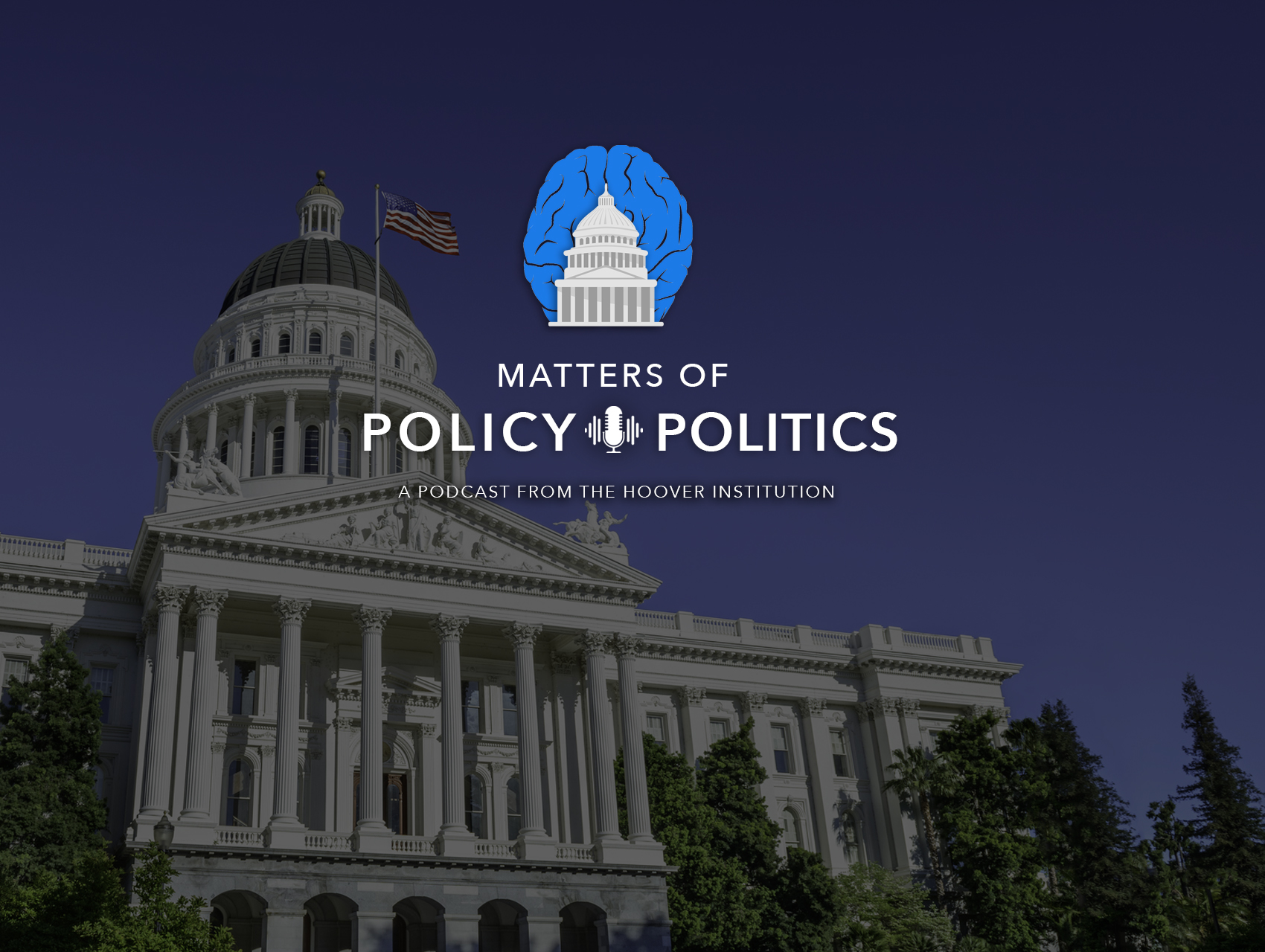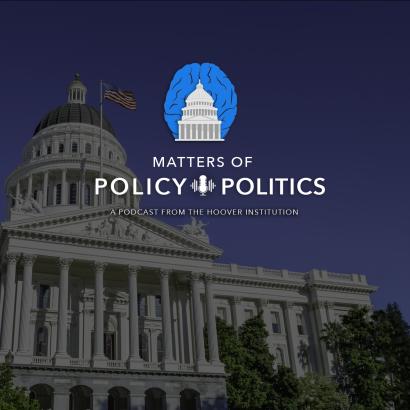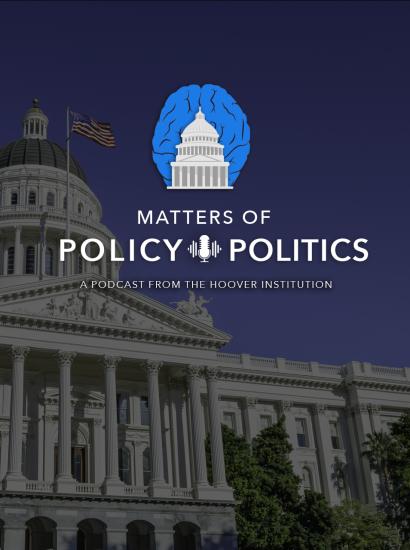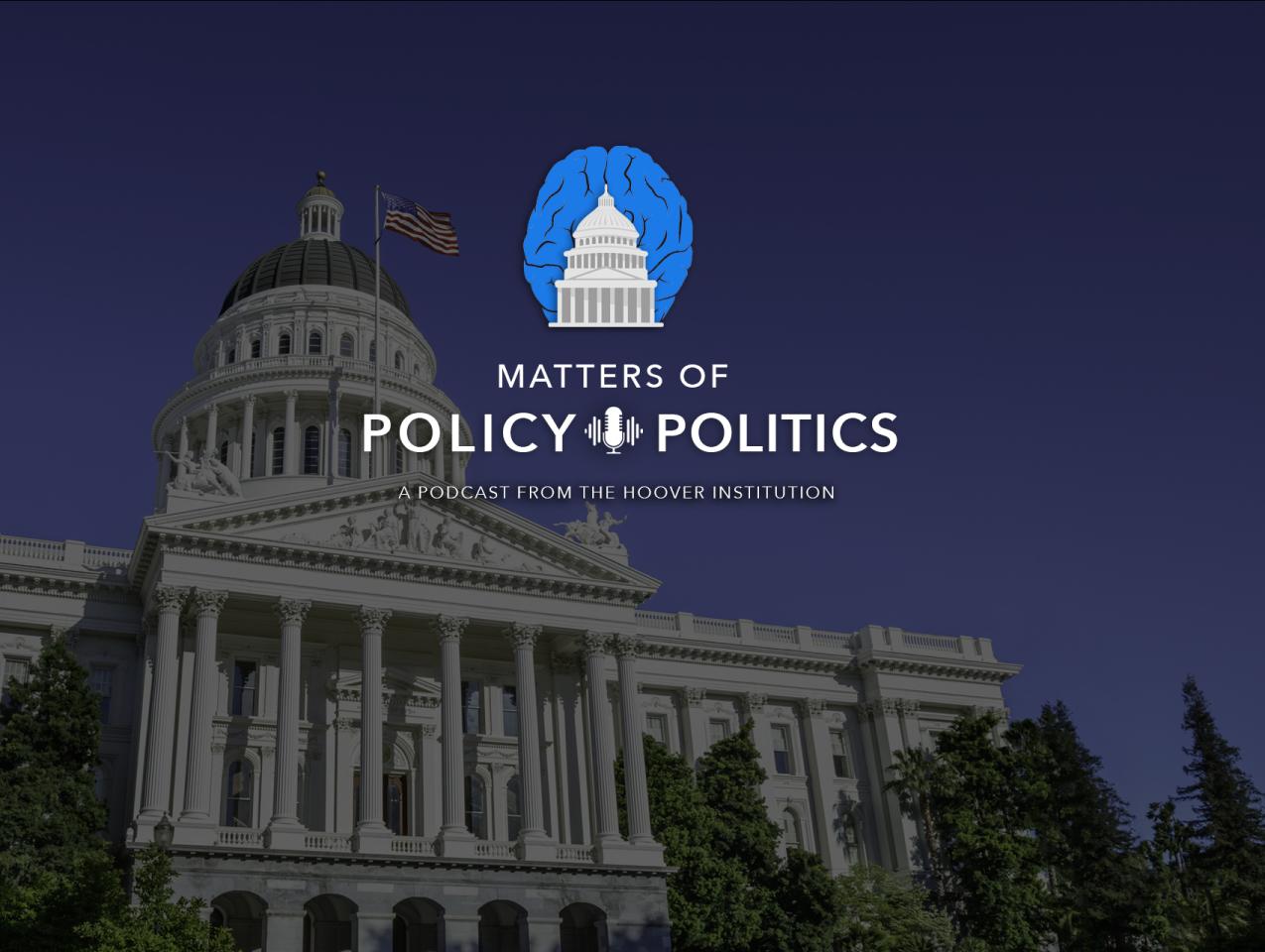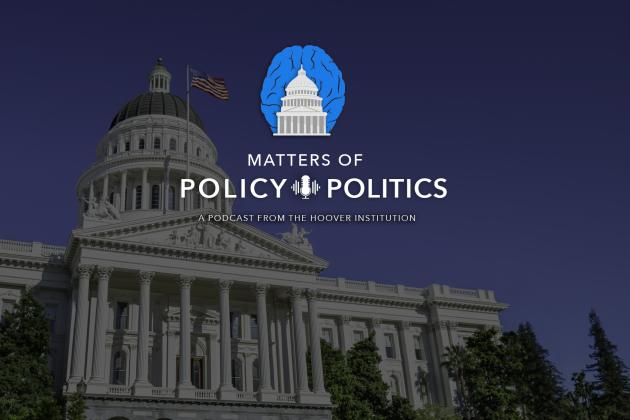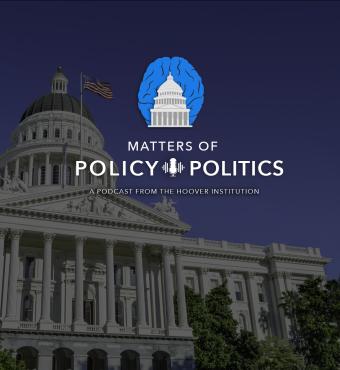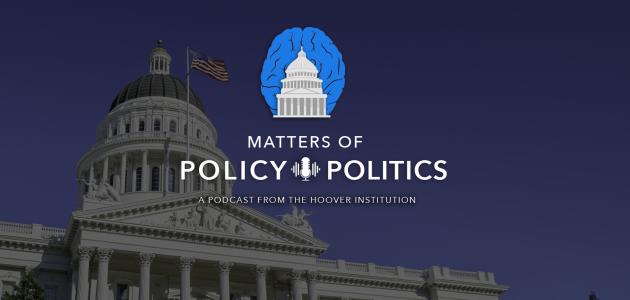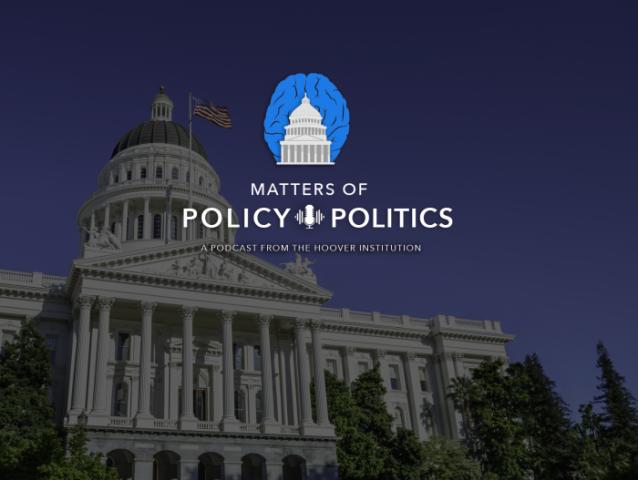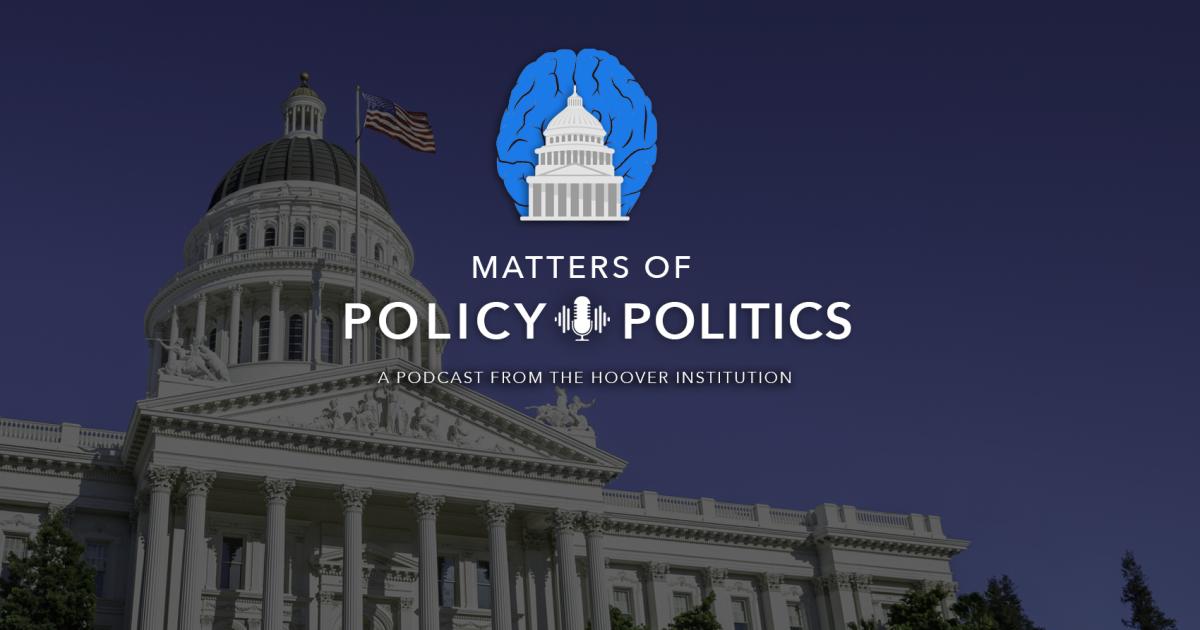San Francisco’s fentanyl “crackdown” begins; California’s budget drama heats up inside the State Capitol; and Governor Gavin Newsom’s ongoing obsession with national politics prompts a media backlash back at home. Hoover senior fellow Lee Ohanian and distinguished policy fellow Bill Whalen, both contributors to Hoover’s “California on Your Mind” web channel, join Hoover senior writer Jonathan Movroydis to discuss the latest in the Golden State, including what policy urgencies Newsom faces other than fiscal triage, plus a window into California’s cultural disparity that is the Lakers-Warriors NBA playoff series.
>> Jonathan Movroydis: It's Thursday, May 4th, 2023, and you're listening to Matters of Policy and Politics at Hoover Institution podcast devoted to governance and balance of power here in America and around the free world. I'm Jonathan Movroydis, senior writer at the Hoover Institution, and I'm sitting in the chair of Bill Whalen, the Virginia Hops Carpenter distinguished policy fellow in journalism, so that he can answer questions and provide commentary about Californian policy and politics, in which he is well versed.
Bill Whalen, in addition to being a Washington Post columnist, writes with Hoover's California on Your Mind web channel, and edits and publishes Eureka, a quarterly forum featuring analysis and commentary from Hoover scholars and California's top thinkers. Whalen is joined today by Lou Hainan, Hoover Institution senior fellow and professor of economics and director of the Edinger Family Program in macroeconomic research at the University of California, Los Angeles.
Ohanian also writes twice per week about the policy environment of the Golden State for California on your mind, good day, gentlemen. Let's talk about the latest developments in policy and politics in the Golden State. Let's get right to it, Nordstrom's department store this week announced its closing all stores in San Francisco.
This is the latest in a wave of closures that has included anthropology gap in Whole Foods. The reasons, as we've discussed before on the show, is soaring crime rates. The company's chief store officer, that is Nordstrom, wrote an email to staff, quote, the dynamics of the downtown San Francisco market have changed dramatically over the past several years, impacting customer foot traffic to our stores, and our ability to operate successfully.
What kind of dynamics, you might ask? It has been reported that at Whole Foods, in the case of Whole Foods, for those 13 months that it was open, workers were frequently threatened with weapons, security guards were assaulted, homeless were throwing food and defecating inside the store, and there were fentanyl overdoses in the bathrooms.
In total, nearly 600 911 calls were made from that store. But let's stay on this issue of fentanyl, Lee, you wrote about this topic in your California on Your Mind web column for this week. You write that in 2013 there were less than 100 fentanyl deaths in the state, in 2021, which is the latest year of which data is available, that number is nearly 6000.
Governor Newsom this week began his crackdown on open air markets in San Francisco to combat this menace. Lee, can you talk a little bit about your column and what is being done or not done in the Golden State to combat the sale and use of this legal drug?
>> Lee Ohanian: Yeah, well Jonathan, up to now, really very little has been done to deal with fentanyl. And this goes just way beyond the usual types of debates about how to deal with drug abuse, because fentanyl is about as toxic as anthrax, is what I found out while I was researching this column.
Just one-eight of a teaspoon, so roughly a pinch of salt of powdered fentanyl is enough to kill 100 adult males, which is three milligrams, will kill an adult male. So, this is incredibly toxic, and it is devastating the state right now. As you mentioned, under 100 overdose deaths in 2013, and now we're up to about 6000 within the state.
Just in the last four years, San Francisco has recorded 2000 fentanyl overdose deaths. The death rate by fentanyl overdose is about twice as much at the height of the pandemic as was COVID. To give you an example of just how serious this is, about 6500 to 7000 overdoses are reversed, every year in San Francisco.
So, it's really destroying the city, in my opinion, and as you mentioned, Newsom to much of his own self-congratulatory fanfare, has deployed some California highway patrolmen within the city, in the neighborhoods that have been most affected by fentanyl. So, we'll see if that makes much of a difference, but one other issue I touched on the column is that even if there are more arrests of street level drug dealers, it's unclear whether anything is gonna happen.
Because I found out there's a 2016 California State law which effectively says that victims of human trafficking can effectively commit crimes, and use the idea that they were victims of trafficking as a legitimate criminal defense. And that's exactly what is happening in San Francisco, there were two cases against two Honduran men who were arrested for selling fentanyl in San Francisco.
There was no question really that they were guilty, the police had enormous amounts of evidence, and arrested them on undercover buys. And so, what they did was they claimed they were victims of human trafficking from a Honduras, they provided no evidence of this. And the DA's office provided enormous evidence that they almost certainly weren't victims of human trafficking.
Long story short, both trials ended in hung juries, which meant that both of these drug dealers were let go, and the DA's office has chosen not to refile charges. So, we have the state law that's being abused, that basically is a get out jail free card for any foreign drug dealer who is illegally in the state, and who is selling fentanyl.
And one of these fellows said, I still owe my coyote, which is the term used for someone who smuggle them over the border, I still owe my coyote $9,000. And you feel like saying, okay, well go back on the streets, have that, and go ahead and earn your $9,000 and pay off your coyote, it's just absolutely ridiculous.
And at the state level, really very little is being done to deal with this, the state public health committee has essentially refused up to last week to listen to new legislation about fentanyl. It's a very, very progressive group, they essentially see everything associated with dealing with drug abuse in the state now, any new legislation as harkening back to what they considered to be the failed war on drugs.
So Jonathan, I'm very pessimistic whether we're going to deal with this at all effectively, and I suspect we will lose many, many more people in California fentanyl deaths.
>> Bill Whalen: Yeah, well Lee, kudos to you for timing here, because as Jonathan mentioned, this is the week that the governor's much vaunted, quote, unquote, crackdown began in San Francisco.
But I would note that this crackdown is sort of like what the Biden administration has done in Texas with the border where the announcer is sending 1500 troops down there and they're doing administrative work. And so, the question here is what exactly are the CHP and the California National Guard deployments doing in San Francisco?
And I believe the San Francisco Chronicle, Lee and Jonathan actually had reporters out yesterday on Wednesday looking around for signs of boots on the ground to see people making arrangements or do anything, they didn't find anything. And then so, I guess they're gonna do kind of behind-the-scenes intelligence gathering or not, but Lee, what I think we have going on here is a cultural clash, if you will.
The governor, who's a former San Francisco mayor, ironically enough, comes into San Francisco, walks around, sees things for himself, doesn't tell the media by the way that he's coming, which we'll get into in the next segment, and then announces this very dramatic deployment to deal with it. So, he is taking this from a law enforcement angle, but if you talk to local leaders, they don't like the law enforcement approach to this, Lee and Jonathan.
They wanna create what are so called safe consumption sites, and this essentially means that instead of policing, they want to sort of shepherd people into certain locations to do drugs, to shoot up or get high or what have you. And this is a clash, plain and simple, do we treat the fentanyl crisis and drug use in San Francisco as a criminal crisis or a public health crisis.
>> Lee Ohanian: Well, exactly right, when Newsom made his pronouncement, he was very careful to say, and in the normal. Gavin, self-congratulatory, sort of over the top, self-absorbed way he has us speaking. He talks about we are deploying the highway patrol and the National Guard here in San Francisco to deal with those people who sell this toxic poison within our cities, and we're gonna get this under control.
And he was very careful to say, now, let me be very clear. This is not about targeting those are our fellow citizens who are struggling with substance abuse. But, Bill, years ago, years ago, many European cities had enormous drug problems because they essentially tolerated open air drug abuse.
And that is no longer the case. One can use drugs in European cities, but if you're out there shooting up on the streets and passing out on a sidewalk, you're hauled off into the jailhouse, and that would be seen as anathema within Newsom's party. So I don't see how one successfully deals with this unless one has a clear policy towards getting people off the street.
And I don't believe that offering safe injection sites is really the answer.
>> Bill Whalen: Now, you asked Lee, what will it take to get Sacramento's attention and deal with this more forcefully? I will rather cynically say that it takes a famous surname in this regard. In the 1990s, we did all sorts of criminal justice reform in California.
Some of it moved along, but it got a boost of sorts when Ennis Cosby, who was the son of Bill Cosby, was murdered alongside a California highway. His car had, I think, had a flat tire, and somebody came up and randomly killed him. And suddenly, my God, it's Bill Cosby's son.
We have a problem in California. Go back to AIDS in the 1980s, Lee and Jonathan, and it's a terrible health tragedy going on. And then we find out that Rock Hudson has AIDS, and it kind of takes off new levels. So, part of me thinks that not until somebody with a very famous surname in California, in San Francisco or Los Angeles in particular, somebody either with star power connected to star power.
Not until that happens, maybe fentanyl doesn't get the attention legislature should. But you mentioned the potency of it, Lee. My God, you're the father of a teenage son. This must be every parent's nightmare in this day and age just to worry about your son somehow randomly coming across this drug.
>> Lee Ohanian: Yeah, Bill, paramedics, so I mentioned that, there's up to 7,000 fentanyl overdoses that are reversed each year in San Francisco with a product called Narcan. And it's just absolutely awful to think about paramedics when they administer Narcan. You look at them, a lot of the times they're wearing what looks like hazmat suits.
They look like they're ready to go up in a space craft and land on the moon. They are covered from head to toe wearing hazmat suits because this is such a remarkably toxic chemical, as I mentioned, it's approximately as fatal as anthrax, which, of course, is a well known bioweapon.
So it's horrible. And it goes way beyond the debates that people have had for years about, well, what do you do about drug abuse? How do you deal with drug addiction? There's a libertarian perspective that says, well, let people do what they're gonna do. I used to be more inclined towards that way of thinking.
But what I've seen is that addicts, whether people care about, whether personally they're destroying their lives or not, they end up becoming wards of the state and very expensive wards of the state. And when you think about the involvement, potential involvement of children, and 224 kids between the ages of 15 and 19 died of fentanyl in 2021, it is just horrifying to think about.
>> Bill Whalen: Yeah, if we could loop back to Nordstrom for a minute. Jonathan mentioned the introduction. Yeah, Nordstrom is pulling the plug on San Francisco banana, the republic has done so. Gap anthropology, Lee and Jonathan reads like a suburban mall, where your kid would hang out on a weekend and whole foods as well.
Interesting stat I saw today in the ongoing saga of what's happening to San Francisco. We talk about job loss, we talk about office vacancy and so forth. Here's a new one for you to chew on, Lee, cell phone use. Study shows that cell phone use in San Francisco is down 32%, it's a dead city.
>> Lee Ohanian: It is and city leaders are trying to paint a much rosier picture and talking about various plans they have of resuscitating downtown. But the sooner people really push the panning button and pull the emergency cord, that's really what's required to get San Francisco trying to turn it around in the right direction.
And front and center, the number one thing that has to be dealt with is homelessness, drug abuse, and crime, and all of those are fundamentally interconnected. And until San Francisco does that, nothing's really gonna change. Then the economy will continue to suffer. And Bill, the program or the policy paper that was put together by an urban planning consulting group that was hired by a private San Francisco business group.
It didn't once mention indirectly homelessness, crime, or drug abuse. So, we can continue to pretend that the emperor has a new suit of clothes, but we know exactly how that story ends.
>> Bill Whalen: Well, it is, so just think of us in terms of real estate. If you wanted to lure somebody back into San Francisco to live or work there, eyesores would always catch your attention when you're first looking at a house.
And if the person next door is shooting up, there's a homeless encampment next door to the house. You're not gonna buy the house and this is a problem in San Francisco. And the final now that we can move on to the idea of safe consumption sites. One thing that San Francisco suffers from horribly, Lee, is NIMBYism.
And they've gone through this issue for decades. When it comes to homelessness, somebody always wants to build a homeless shelter, and then guess what? You find a location for it, the people in that location just have an absolute conniption. Just be very curious to see what's gonna happen.
If indeed the city goes through with the plan for safe consumption sites, whose neighborhood are they gonna put it in?
>> Lee Ohanian: Yeah, absolutely, there'll be enormous pushback and as well, there should be. There are people who are paying their taxes and when they purchased that house or they signed on that apartment lease, they did not.
Part of that deal was not having people shooting up with fentanyl 10 feet away.
>> Jonathan Movroydis: Gentlemen, let's talk a little bit more about Governor Newsom. Bill, in your California on your mind column released today, you focus on Gavin Newsom's wanderlust. He really loves traveling. He was just in Washington DC, at the White House correspondents dinner last weekend, which you explained is an effort to keep himself in the buzz of national politics.
Unless Biden steps aside, Newsom is not likely to run in 2024. But as you write, the governor did succeed in having his recent messaging, in his campaign ads run in red states and in his social media, integrated throughout Biden's first 2024 campaign ad. Biden's video describes how his administration stands for individual freedom.
Quote, MAGA extremists are lining up to take those freedoms, Biden says, listing off issues that his base worries about, banning books, tax cuts for the wealthy, reducing Social Security payments, and abortion ban. But are all these efforts paying off for Governor Newsom when his own state is confronted with daunting challenges?
The San Francisco Chronicle pendant editorial a few days ago, saying as much and wants the governor to focus on housing. This housing aside, where else should the governor focus his time?
>> Bill Whalen: Well, I'm gonna ask Lee to give me some thoughts, and I have a few of my own.
But if the idea that imitation is a serious form of flattery, Gavin Newsom should feel very flattered because that three-minute video put up by the president's reelect campaign. Making his case for another four years, he just throws around F bombs, F being freedom. And this is kind of Gavin Newsom 101, whose inaugural address in January sprinkled with the word freedom.
It's a word he tossed around last summer and running ads in Florida against Ron DeSantis. DeSantis, of course, hailing Florida is a freedom state. So I think we all need to find a different word. It's getting overused right now, but the governor is succeeding at the national level in terms of getting noticed as being a force.
And being very ready, waiting in the wing should something happen to Joe Biden. And this is kinda, I call it vulture politics, where you're just kind of sort of circling around like a buzzard and waiting to see if there's a carcass to dive in on. So you're right, Jonathan.
He's trapped in terms of 2024 right now if Biden is running. But 2028 sits out there. What caught me about being at the White House, correspondence Terry. He didn't go to the dinner itself. He came back to California, but he worked the cocktail circuit that precedes the dinner.
And why did he do that? Cuz it's chock full of national reporters, the kind of people who write profiles, who do a top ten list of candidates who are gonna come out to California sometime and write flattering profiles of him. So very smart at his point. But Lee gets the question, Jonathan mentioned the San Francisco Chronicle of all publications came down pretty hard on the governor the other day and said he needs to stay at home and focus on California business.
And Lee and their editorial, they focused on housing. And I wanna get your thoughts on housing of what else? I'll give you something he might wanna get involved in right now, and that's the Hollywood writers strike, which it's not just about show business, Lee. But it's about the Southern California economy, because if you don't have scripts, you don't have production.
A lot of people are out of job. So what's governor gonna do? He's said to get involved in the strike of both sides to ask, but I don't think the studio is gonna ask anytime soon. I'll give you another one to Condor Lee, that's the teacher stride in Oakland, which began today on Thursday.
Teachers want more money, there are bills in legislature that would increase teachers pay by 50%. But why doesn't the governor sit both sides down and get them to end the strike? I think it's their third strike in something like three years. Every day they're on strike is one less day that a kid gets educated in Oakland.
And that's the last thing could happen in a city like Oakland. So yeah, I put them in the strikes, Lee but it does seem the chronicles reading your stuff, Lee. Cuz they did make a beeline toward housing.
>> Lee Ohanian: Well, last year when Newsom ran for successfully ran for a second term, the Chronicle endorsed him.
No surprise there. And Bill, the Chronicle wrote the following words. When they wrote their endorsement, they put a little bit of a proviso and wrote, California's problems are far too urgent to indulge our executive office being used as a campaign commercial. Bill, in my opinion, that's exactly what has happened with Newsom over the last few months.
He's gone to southern states with his $10 million pack. It is absolutely a campaign commercial. And Bill, I don't know if you saw this, but there was an MSNBC reporter named Stephanie rule who interviewed Newsom recently. And she said Governor Newsom. And he responded by saying, I love when you say governor.
And she responded by saying, not president. And his response was, no, is Gavin. So he had a little bit of a slip of the tongue there regarding her tongue in cheek remark about not president. And he stumbled a bit there. So we have a governor who I think has essentially been on AWOL.
As far as I can tell when you look at the state's major problems, he mentioned housing, you mentioned schools in terms of what's going on in Oakland. And Oakland has just a terribly performing school district. And as you noted, the teachers have been on strike now. Yeah, I think this is the third time in a few years.
So schools, housing, the business climate, taxes go along with business climate. These are all issues that there's been no progress whatsoever since Newsom has been governor, and he's been governor now close to 4.5 years. So I think there's only so long that a person can govern just by righteous indignation.
And that's how I see Newsom has been governing. There's always indignation about something. And 99% of the time it's about the Republican Party. And it's about abortion and it's about maybe real or oftentimes imaginary threats to what he calls freedom in democracy. Those seem to be the knee jerk reaction words that he uses.
But my God, there are 13 million people in the state who qualify for Medicaid, which amounts to a family of three with a household income of less than $41,000 per year. So think about that. Think about living in the state of California, family of three, less than $41,000 per year.
What are those people have to say? Who has those people's backs? So the governor hasn't delivered, there's no question about that and I'm glad the Chronicle calls him out on that. Bill I think I would be so happy if he intervened in the Oakland schools strike. And brought them together because it is devastating to think about what is going on with the education of those kids, even outside of the strike.
It's a horribly performing school district.
>> Bill Whalen: Well, don't hold your breath on that one, Lee. I mean, did he get involved at all in terms of pushing kids back in the classroom? No, he just sat by and let the California teachers associate and dictate terms. The problem with getting involved in the teacher strike is he alienates teachers unions, which he does not wanna do.
The problem with getting involved in the writers strike, Lee, is if he picks a side, I assume as a progressive Democrat, he would side with those struggling writers. Then he's upsetting a lot of people on the west side who produce entertainment, who write cheques to candidates. And so he has to kind of choose money before muscular politics, if you will.
So he'll just as soon stay out of it. But housing, I think, is really important here because it is just a bad MO of this governor, which is, he loves to come out with big, fanciful ideas. And you wrote a very good column, which I'd suggest to our viewers to go back, revisit about how the housing plan is coming up short.
And Lee the numbers on what he proposed and where he fell short, which you can tell us. But it's just, it's kind of vintage Gavin Newsom and that he throws out a big idea and then the devil's not in the detail. The devil is in the follow through, and he just doesn't follow up on it and really do the heavy lifting to get it across the finish line.
Same thing when he's mayor of San Francisco, said he would solve homelessness in San Francisco in a decade and then bailed on San Francisco to become lieutenant governor. He just doesn't follow through on these plans. And here with housing is a big problem, because housing gets the heart of so many issues in California, including the rather tenuous middle class existence, which I think we're gonna get to in a moment.
Cuz the governor said in that same interview, Stephanie ruled that California is a low tax stately, which I think might come as something of surprise to you as an economist.
>> Lee Ohanian: Bill, I don't know where that's coming from. The tax foundation, which is a highly regarded research center, nonpartisan think tank in DC, all they do is focus on tax issues.
And California is the second highest tax state in the country. It is about seven times worse than the lowest tax state, which is Alaska and Vermont. Our good friend, Bernie Sanders, Vermont Is the highest tax state, just by a hair, literally, just by a hair. California and Vermont, for all practical purposes, are high.
So there's no question California is a high tax state, so I don't know where Newsom is coming up with those types of numbers. But Bill, he reminds me of an event MC, who starts out and looks at the audience and gets them all riled up, and he walks off the stage, and then there's nothing that follows them.
>> Bill Whalen: You called him Game Show Gavin, didn't you?
>> Lee Ohanian: One time I called him Game Show Gavin, I can't take credit for that. I think there were a few newspaper editorial columns that had him called Game Show Gavin when he was handing out fistfuls of dollars to try to get people vaccinated.
>> Bill Whalen: To close out on the taxing, Lee, I think here's the issue as I see it, you can take a tax study and you could twist it a million ways if you want to. The issue in California, it's not just taxes, it's livability. And it just, as you're a middle class Californian, good luck in this Barbell economy living.
And what's the best indicator of this? Go to U-Haul and look at U-Haul's annual study of people leaving states and people are leaving California. Some people might be leaving it by choice because they could do remote work elsewhere. But I argue a lot of those people, Lee and Jonathan, leaving because of necessity, because they just can't afford a home in California, making middle class wages.
>> Lee Ohanian: Absolutely, the state's median home price is about 800,000. There's about, I think, 20% of Californians who could afford the monthly payments, including insurance and property taxes. But, Bill, so those are the kind of statistics, if people are interested, you can go to the California Association of Realtors.
They've got great data, and they present affordability statistics at the state level, also at the county and the city level, and those statistics are grim. But those statistics are even worse because those affordability statistics assume that a buyer has cash that can close the deal, which is, a conventional mortgage is 20%.
20% on an $800,000 home is 160, add in a few more bucks for the other types of closing costs. Bill, of those people living in California who have never owned a home, hardly any of those people have $175,000. So absolutely, people are leaving this state, and it's because they're looking for a better way of life.
And that better way of life is, they're gonna go somewhere where they can afford a home that's not gonna cost them $800,000. They're gonna go to a state where they can buy a decent home for $300,000. And there's a lot of states that provide those opportunities.
>> Bill Whalen: I'd be curious to see polls of those displaced Californians to see whether or not they would vote for Gavin Newsom for president, but time will tell.
>> Jonathan Movroydis: Back in Sacramento, and more on Gavin Newsom, ahead of his May revise of the budget, he rejected a state senator's plan that would boost the tax rate on corporate income by another two percentage points. And pause business net operating loss deduction in times of budget emergencies. Nevertheless, despite a massive $100 billion surplus last year, this year there is a $22.5 billion deficit.
While Newsom wants to rein in spending, many powerful lawmakers want to expand that budget. With a June 15th deadline looming, there's a three-way split among the Capitol's Democrats. This showdown may mark the first time in state history that the budget won't be passed on time. Gentlemen, what do you see as the best compromise here?
>> Bill Whalen: Well, let me take this one, having worked for a governor, these are not fun times to be in the governor's office when you are looking. Long story short, the governor puts out a budget proposal in January, then he gets tax receipts in the spring. And then come the middle of May, he put trusts out the revised budget, the so called, May revise.
And then that's what he gives to lawmakers, then they hammer out where to go from there. It's an easy thing to do when there's money to spend because everybody gets a piece of the pie. It's not an easy thing to do when you're in the red, as California is right now, and then something has to be cut.
But as you mentioned, Jonathan, yeah, there's a difference of opinion as to what the state senate wants to do, what state assembly would wanna do and what the governor wants to do, and nobody wants to cut. Instead, there is this instinct by the state senate to pass taxes, even though they tried to disguise it as, in this case, as a bill that only impacted about 2,500 companies in California, Lee.
They advertised it is generating a lot of revenue, about $6 billion, argued that it would be temporary and so on and so forth. But Newsom, to his credit, he hung tough on this, he wouldn't buy what they were selling. But now he has to sit down and maybe this kind of curbs wanderlust because he has to actually stay in Sacramento and negotiate with these guys, Lee.
So here we're gonna see what happens now, because California does have a constitutional provision that requires a balanced budget, and as Jonathan mentioned, does require a budget by June 15th. So it's in place by the July 1st fiscal deadline. What's gonna happen here? And so, welcome to the fun zone, Lee.
>> Lee Ohanian: Yeah, well, the governor needs to show leadership and establish leadership within his party. And what is so sad about the state is that there's no sense in which the supermajorities in the Senate and the assembly consensually think about living within a moderate size budget. California is one of the highest spending states in the country.
In the current fiscal year, 300 plus billion dollar budget works out to over $20,000 per California household. It's about 50% higher than it was just right before COVID. And I would love to hear from anyone who can tell me that that 50% increase in state government spending has led to any improvement in anything this tangible.
Housing, no, schools, no, water, no, roads, bridges, highways, no, I can go down the list and there's been no improvement that I can see or any statistics that I can observe. So there's absolutely no improvement whatsoever. And so you've got Democrats saying, well, let's try to raise taxes some more.
And Bill, interesting that you noted that Newsom held tough on that, I'm really glad he did. All this kind of belies the idea that California is a low tax state. If it was truly a low tax state, then perhaps one might have a reasonable debate about adjusting taxes during a difficult year.
But when he declined that tax increase, he noted, well, this is gonna be really difficult for businesses, and we've already got some pretty high taxes on corporations. And Bill, when the Democrats announced that, well, this will only really affect 2,500 businesses, those are enormous businesses. And we know that businesses are fleeing the state at twice as fast as they ever have in the past, including enormous businesses, Tesla, Hugh Packard, Charles Schwab.
So I'm glad Newsom declined that, and I really hope he can make some headway with his colleagues in the assembly and the Senate. One thing, Bill, that shocks me, I guess I shouldn't be shocked anymore after writing this column for the last five years. But when Newsom decided to default on the state's nearly $20 billion loan to the federal government.
A loan they received to buttress the unemployment insurance fund, which had been rated to the tune of $34 billion by fraud that we spoke about recently. Bill, I'm surprised that California defaulting on a loan of that size. There was hardly any coverage whatsoever in the media. There was an op-ed in the mercury.
I didn't see anything in the Times. There might have been a small story in the Sacramento Bee. You've been really interested in the connection between Newsom and the media. I would say if anything, they were really kind to him on this particular story because, where I said, it's just egregious, the fifth largest economy in the world defaulting on a $20 billion debt to the federal government, and our businesses end up holding the bag on that.
>> Bill Whalen: It's interesting they didn't go after him on that, and yet they complained very much about the way they're treated, Cal matters ran a piece a couple of weeks ago. Cal Matters is kind of a watchdog, Bulldog media entity in Sacramento, and they complained about just trying to do business with the Newsom administration, going to government PIOs, public information officers and officials and asking for comments.
And they don't get calls returned, or sometimes they get calls returned. Gee, after the story is run, sorry to get back to you sooner. Sometimes they ask for questions in advance. It really is a remarkable, a remarkably dysfunctional relationship, they'll go after him. But, you know, I think, Lee, the governor's in kind of a bind here right now in this regard.
If you go back to 1991, Pete Wilson comes into office and he and Willie Brown sit down and they have a horrible budget situation to deal with. There's something, a $14 billion hole in a $43 billion budget, That's how small California's budget was back then. And Wilson and Brown craft out a deal where they agreed do temporary tax increases and cut spending.
Good luck getting the Democrats to cut spending in Sacramento, bbut the governor has now said, I don't wanna raise taxes. And when you think about it, Lee and Jonathan, by what he said to Stephanie rule and going on his way to say that California is actually not a punitive tax state, to now turn around after slam taxes on people would be problematic.
And then on top of that, Lee and Jonathan, he was in Washington DC, not just to hobnob with reporters, but also to do meetings with the Biden campaign if they wanted prominent Democrats who are gonna help raise money. So how is he going to, with an election coming up, make any kind of argument that the economy in California is so wretched that we have to raise taxes?
The Biden White House doesn't want to hear that.
>> Lee Ohanian: No, they don't, they don't. And Bill, it's interesting when we think about the changes California could implement to create more opportunities for businesses to stay for new businesses to start, to bring a lot of high school workers here to the state.
Again, the government really has been AWOL. I'll just go back to this statement that you can't govern by righteous indignation year after year after year. And he's been governor for what, four and a half years, ostensibly has, what, three and a half years left. What will people expect from him and what can he realistically deliver?
Can he focus enough? Can he follow through? I see no evidence of that.
>> Bill Whalen: Well, we'll see what he does when he actually unveils the may revise. And if he draws any lines in the sand, and he's already made it clear he does wanna go along with this tax on California businesses, will he say flat out in that announcement, no new taxes?
Will he call for any specific spending? Will he do this publicly, Lee and Jonathan, will he do it behind the scenes in terms of negotiations? We'll see, but it's kind of a different set of skill set that he has not really needed for the past few years, so stay tuned and see what happens.
>> Jonathan Movroydis: Gentlemen let's conclude this podcast on a lighter note. The Western Conference semifinals continue tonight for the NBA and San Francisco with a game two showdown between two California teams, the Los Angeles Lakers and the Golden State Warriors, led by their respective superstars, LeBron James and Steph Curry.
On previous podcasts, we talked about the cultural differences between California's north and south. The north is where the techies reside and exert influence, the south is all about celebrity glamour. Gentlemen, can you pick a winner for this series? And two, despite all the problems we talk about in California, can you describe why this matchup is a gift to the game of basketball and all those who watch it around the world?
>> Bill Whalen: Well, the winners would be the National Basketball Association, which, going to these playoffs, had the glamorous warriors as the 6th seed and the ultra glamorous Lakers as the 7th seed. This is kind of a clash of old money versus new money, if you will, and that the Lakers have been a glamour team going back to the 60s and 70s with Wilt Chamberlain and Jerry west and then Shaq and Kobe and so on and so forth, Magic Johnson, of course.
The warriors have been prominent in the NBA since about 2014, 2015. So about a decade run here. So, yeah, it's the NBA, losers would be people like me who are on the West Coast, right now on the east coast, right now I'm in South Carolina, so this game doesn't come out until 9 o'clock tonight.
So I've got to make a decision, do I stay up and watch it or not? This is the West Coast advantage plane and simple. But it really, Lee, is kind of a fascinating cultural clash in this regard. It is Northern California versus Southern California. And just look at the people sitting courtside.
Who sits courtside at Lakers gaines, besides Leo Hadiant It's celebrities,
>> Bill Whalen: It's Jack Nicholson makes an appearance, Leonardo DiCaprio, Denzel Washington and so forth. Who sits courtside at warriors games? Tech bros. And so, you kind of see the Southern California economy versus Northern California economy. Lee, I don't know, are people, people are now driving around Santa Barbara with their Lakers flags on their cars, or is it the bandwagon?
Not left the, garage yet.
>> Lee Ohanian: The NBA had two dreams come true because the Lakers were as the 7th seed, the Lakers were playing the second seeded Grizzlies and the Warriors were the 6th seed and playing the third seeded Sacramento Kings. So Sacramento, small market team, Memphis, small market team, the NBA is absolutely thrilled, and they won't say this, but they're absolutely thrilled.
The Lakers beat the Grizzlies and the warriors beat the Kings. And now the Lakers and the warriors are playing each other. And, before Tuesday's game and my goodness, even though I've, even though I'm living in Southern California, my family and I are rooting for the Warriors. They had that 14-0 run, I thought Curry was gonna again pull a rabbit out of the hat and win that game.
Before the series, I was calling it Warriors in six. I still have a feeling the warriors are gonna prevail. I don't think it's gonna be in six, I think it'll go all the way, but it's great theater. Curry is perhaps the greatest, well, I think undoubtedly the greatest shooter in basketball of all time.
And LeBron James is a generational talent, so it's gonna be a lot of fun to watch. And game on Tuesday was an exciting one, certainly.
>> Bill Whalen: Yeah, there's just so much, so much energy and drama for a second round playoff game. Keep in mind that whoever wins this series has to play yet again and win that series just to get to the NBA Finals.
So to see this kind of intensity at this level is quite something. And you're absolutely right, Lee, LeBron James and Steph Curry, the two transformative figures in pro basketball this century. LeBron is the all time scorer and Steph Curry has fundamentally changed the game, now people shoot from three point land.
What also catches my interest in this Lee is the arenas in which the two teams play. The Lakers used to play what was called Staples center, it's now called, I think, Cryptocom center. So it's named after a cryptocurrency platform. I'm not sure if I'd want to have that my arena right now, given what's happened to crypto.
The Warriors, meanwhile, used to play at Oakland, Lee and their arena carried the name of Oracle on it. They've since moved to a state of art arena in a rather gentrified pocket of San Francisco, and it bears the name of JP Morgan Chase. Why is that interestingly? Because why JP Morgan Chase just acquired a substantial majority of First Republic's assets.
First Republic, of course, ironically due to bad financial decisions made with deposit money from all those tech bros are sitting courtside in the warriors games.
>> Lee Ohanian: Yeah, it all comes full circle. And certainly, the warriors fan base, at least those who are going to the games, has changed substantially since they moved from Oakland to the Tony part of San Francisco.
Bill, a few years ago, I did a UCLA fundraising event, and Kareem Abdul Jabbar was there. And so, I was introduced to him we chatted a bit. Remarkably interesting fellow, extremely bright. So, we were talking about the NBA, and here's what he had to say about Steph Curry.
He said, and at the time we did this, Kareem was helping coach the Lakers. He was essentially tutoring their big men. So he said, yeah, one day I'm at the arena, I'm watching Curry. He's not missing, 2030 times in a row, from 35ft. He said, that's unheard of.
There was nobody, when I played, that could come close to anything like this. Curry, we've simply never seen anyone with anything close to that kind of basketball shooting skill.
>> Bill Whalen: I don't know here in South Carolina, I've yet to find anybody who likes the warriors. I don't mean as a betting favorite, but just likes them.
And I don't believe if that's a function of just they've been winning for too long, but they just find them kind of annoying. And they really find the court scene annoying, too. I didn't think I'd see it my lifetime, but maybe it's possible to supplant Los Angeles, as a focus of California hate.
>> Lee Ohanian: I would have guess it would have been the Lakers. But yeah, they are the. I think there's a lot of animosity towards them. Yeah, they have been winning for an awful long time. And you've got some players such as Draymond Green, that don't necessarily, I think, show their best side always on national tv.
So, anyway, it should be a great series.
>> Bill Whalen: Should be.
>> Jonathan Movroydis: This has been very interesting and timely analysis gentlemen, thank you for your time.
>> Bill Whalen: Thank you, Jonathan, thank you, Lee.
>> Lee Ohanian: Always fun, gents, take care.
>> Jonathan Movroydis: You've been listening to matters of policy and politics, the Hoover Institution podcast devoted to governance and balance of power here in America and around the free world.
Please don't forget to rate, review, and subscribe to this podcast wherever you might hear it. And if you don't mind, please spread the word, get your friends to have a listen. The Hoover Institution has Facebook, Twitter, and Instagram feeds. Our Twitter handle is @HooverInst, that's @HooverInst. Bill Whalen is on Twitter, his handle is @billwhalenCA.
Lee Ohanian is also on Twitter his handle is @lee_ohanian. Please visit the Hoover website@hoover.org and sign up for the Hoover Daily report, where you can access the latest scholarship and analysis from our fellows. Also, check out California on your mind, where Bill Whelan and Lee Ohanian write every week.
Again, this is Jonathan Mavroidy sitting in Bill Whelan's chair this week. He'll be back for another episode, of Matters of Policy and Politics. Thank you for listening.
>> Speaker 1: This podcast is a production of the Hoover Institution, where we advance ideas that define a free society and improve the human condition.
For more information about our work, or to listen to more of our podcasts, or watch our videos, please visit hoover.org.







